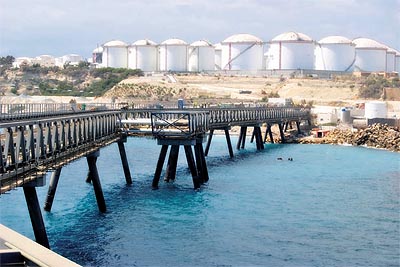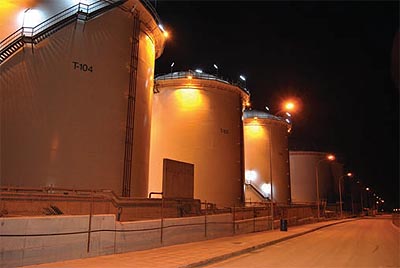
VTT Vasiliko: Cyprus’s Gateway to Energy Storage, Launching September 2014 by Vitol and MISC’s VTTI
Ultimate terminal
Set to begin operations in September 2014, VTT Vasiliko (VTTV) is a storage terminal project in Cyprus being delivered by VTTI, a company co-owned by Vitol, one of the largest independent energy traders in the world and MISC, a leading international shipping and marine conglomerate.
In an interview, general manager George Papanastasiou provides an insight into the project so far: “We are now commissioning the Phase 1 of the terminal, having nearly completed the jetty structure, which extends 1500 metres  offshore. At about 800 metres between the east and west berths of the jetty, it is one of a kind in the Mediterranean.”
offshore. At about 800 metres between the east and west berths of the jetty, it is one of a kind in the Mediterranean.”
Through four offshore berthing positions it can accommodate vessels between 10,000 tonnes to Suezmax size 160,000 tonnes. A recent decision was made to create a fifth berth, positioned inside the Port of Vasiliko for vessels of smaller size, a move welcomed by local marketers and particularly useful for Phase 2 developments, as George says: “The next phase will attract bunkering barges providing fuels to ships. This size of vessel will be between 2500 to 5000 tonnes, and berth five will serve this purpose.”
With Phase 2 scheduled to be operational by 2016 it will consist of 305,000 cubic metres capacity and provide the terminal with the capacity to store a full range of products from gasoline, diesel, jet fuel, heating diesel, bio-diesel, fuel oil and crude oil, adding to the 543,000 cubic metre capacity constructed in Phase 1. The terminal has been designed with full flexibility so that products may be moved between tanks and vessels or to a road tanker-loading facility as required, providing services to local marketers usually operating smaller tankers, or to bigger trading firms where they can use larger tanks for fuels import, export and blending.
“There is a lot of interest for the terminal, because geographically it is positioned at the exit and entrance of the Suez Canal. Products are flowing from West to East, and East to West and we are positioned right in the middle. There are larger refineries opening up in the Middle East and these are growing as the smaller refineries in Europe are shutting down. The demand for rich fuel products in the East is growing in-line with industrial growth in the region.
“By remaining flexible we have been successful in creating a combination that is expected by the local marketers and one that is supporting local business. There are many products such as Unleaded 95, 98 and low sulphur Diesel that are being marketed in Cyprus and this terminal provides the flexibility to accommodate for these. The bigger tanks provide blending facilities for products that come in which are not necessarily of EU specification,” says George.
In line with this, the business has supported the creation of a new laboratory outside of the terminal, employing ten personnel that can re-certify the products so they may be marketed in the EU. With the jetty supporting vessels of 18 metres in depth, it is also attractive for traders looking to break bulk, or indeed create bulk, and has already attracted a wealth of business to the area.
Recognising the potential size of vessels, VTTV looked to address the requirements of providing a 24/7-year round service offering. As such it took the decision to create a sister company to provide towing services, providing both powerful tugboats and pilots, creating a further 20 permanent jobs. “This investment should increase the flexibility of services we are able to offer,” points out George. Supporting the local community, the construction phase of the works generated 780 jobs, and it has since been able to create 32 permanent positions on terminal operations. “We have employed local staff from the local market. These employees have undertaken six months of intensive training at VTTI terminals in the Netherlands, Belgium and in Fujairah,” he adds. As well as the direct creation of jobs in the terminal, other companies supplying food, spare parts and crew changes directly benefit.
powerful tugboats and pilots, creating a further 20 permanent jobs. “This investment should increase the flexibility of services we are able to offer,” points out George. Supporting the local community, the construction phase of the works generated 780 jobs, and it has since been able to create 32 permanent positions on terminal operations. “We have employed local staff from the local market. These employees have undertaken six months of intensive training at VTTI terminals in the Netherlands, Belgium and in Fujairah,” he adds. As well as the direct creation of jobs in the terminal, other companies supplying food, spare parts and crew changes directly benefit.
Faced with certain challenges in the construction phase, George points out that in developing terminal berths, extra dredging was required to allow for the large vessels to perform the complete turning circle, which ultimately caused some delay to the project. “There were also some issues for permits and licenses. This is the first terminal of this kind in Cyprus, so the authorities did not have background to deal with all aspects of the legislation. However, the outcome is a very strategic achievement. We have constructed a terminal that is in the heart of a tourism area with infrastructure that extends out over two kilometres. We have implemented the highest standards of operation, at all times keeping the environment and the local communities in mind undertaking all the work to a very high standard,” he says. Additionally, in the local area is the main oil fired power station of the country, and as it begins a move to switch from oil to gas, resulting in a cleaner and more efficient burn, the terminal jetty is a great asset to support the vessels that will ultimately bring and process the gas.
The growing energy hub has also attracted a future LNG terminal, and should this construction go ahead VTTV is in an ideal position to play a role in the storage of the product. “We have expertise on how to construct such terminals and of course we know how to operate the terminals. Being already established in Cyprus we are in a good position to move into this market, which is different to the products that VTTI currently stores around the world.
“In the mean time our focus is to fill up all the 28 tanks of Phase 1 and we are in negotiations with both local partners and international traders. Following this, completion of Phase 2 will become the target and we are confident of achieving success. Potential opportunities to move into LNG and LPG are in our sights and we are ready to move on them if the demand within Cyprus grows. We are very proud of what we have achieved with the project so far. This terminal incorporates the highest of the industry standards, EU Directives, local legislation, and VTTI standards. We have been very proactive with health, safety and the environment and laid impermeable membranes covering all the area of the terminal to contain products in the event of a leak. Additionally, a modern vapour recovery system collects all the emissions that are produced. We believe we have constructed a fit-for-purpose terminal and an energy hub in the Eastern Mediterranean,” concludes George
VTT Vasiliko
Services: Fuel storage facility and offshore jetty